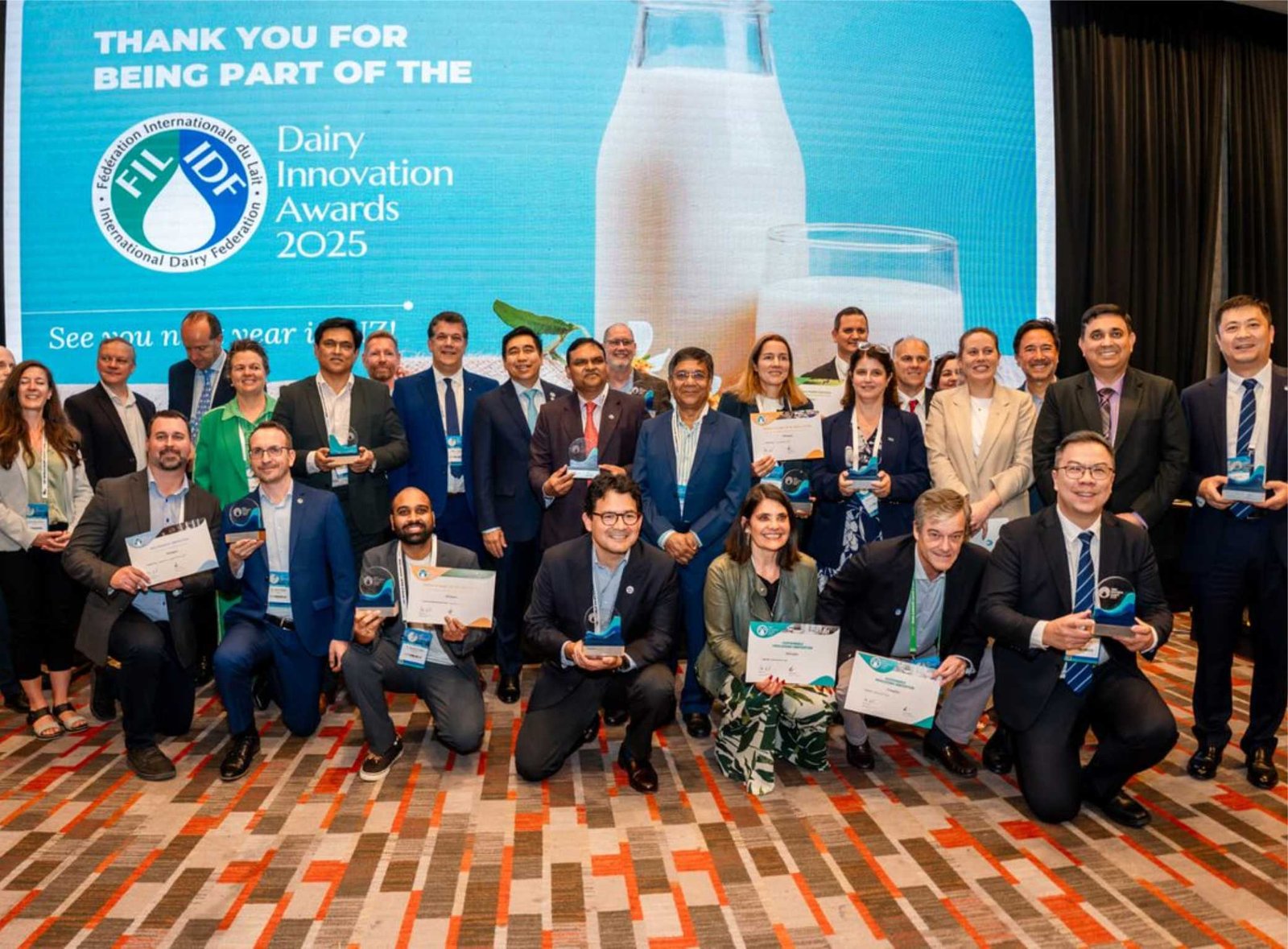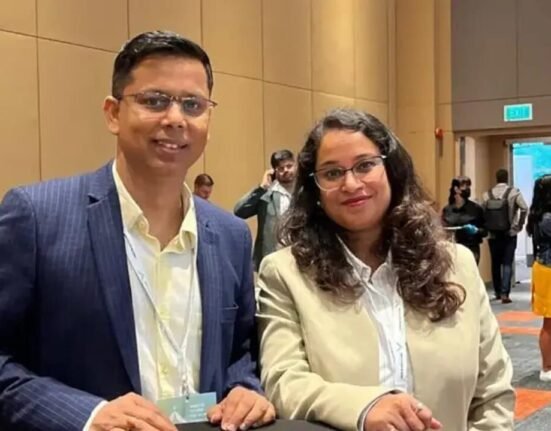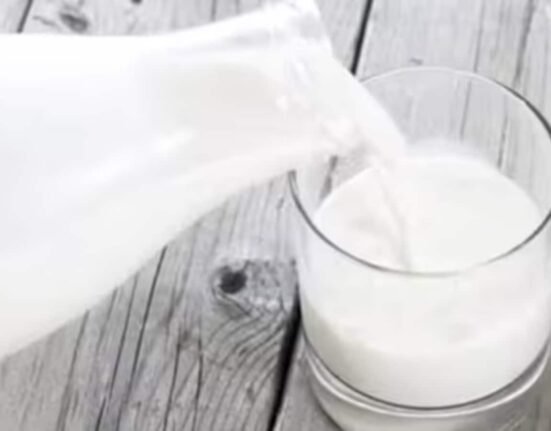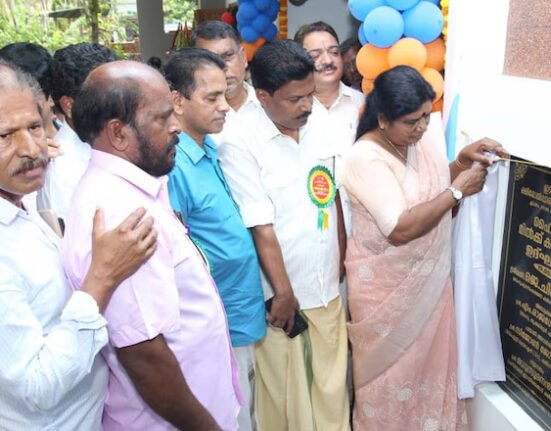The 2025 edition of the IDF World Dairy Summit (held in Santiago, Chile, from 20 to 23 October) provided a global stage for dairy innovation, where the International Dairy Federation (IDF) honoured cutting-edge projects with the fourth annual Dairy Innovation Awards. With over 130 entries spanning continents, the awards underscore how the dairy sector is advancing in sustainability, processing, nutrition and social inclusion.
Why this matters for the Indian dairy industry
India, long recognised as the world’s largest milk producer, is facing new challenges—rising input costs, environmental pressures, evolving consumer demands, and the need for innovation in value-added dairy products. For stakeholders in the Indian dairy sector (co-operatives, private dairies, farmer-producer organisations, and technology providers), the IDF awards highlight best-in-class models of sustainable dairy farming, processing efficiencies, and socio-economic impact. For example:
- They align closely with “sustainable dairy farming”, “dairy technology India”, and “dairy methane emissions”.
- They reflect market drivers such as “value-added dairy products”, “milk supply shortage”, and “milk prices 2025”.
- They underscore cooperative strengths, “Dairy Cooperative News” and “India Dairy Trends”.
Highlighting Indian winners signals that Indian dairy innovation is being recognised globally, which can boost reputation, open up collaboration opportunities, and support investment in new technologies or sustainability practices.
Global winners – Snapshot
While the complete list of winners is available on the IDF site, a few standouts across categories include:
- In the “Climate action in the dairy sector” category, NDDB (India) won for its Carbon Credits from Biogas Plants initiative – a manure management programme generating clean fuel and carbon credits for smallholder farmers.
- In “Sustainable processing innovation”, the Indian entry by SARAS Cooperative Milk Producers’ Union (ZLD plant) was recognised.
- Other global winners include major players across New Zealand, the USA, China and Chile in categories spanning product innovation, packaging transparency and women’s empowerment.
India’s Winning Innovations – In Focus
Here we spotlight the Indian initiatives recognised at the 2025 Awards.
- NDDB – Carbon Credits from Biogas Plants
The initiative by the National Dairy Development Board (NDDB) addresses manure management among dairy farmers, especially smallholders. By setting up biogas plants and generating carbon credits, the model delivers multiple outcomes:
- Reduces methane emissions from manure decomposition – tackling “dairy methane emissions” and advancing “dairy climate solutions”.
- Provides clean fuel (biogas) replacing fossil or wood fuel for on-farm or village usage – contributing to “eco-friendly dairy India”.
- Delivers an additional revenue stream to smallholder farmers via carbon credit sales – strengthening “socio-economic sustainability in farming”.
In winning this category, the model demonstrates how the Indian dairy sector can link GHG reduction with farmer income, making it a compelling example for the “Indian dairy industry”.
- Jaipur Dairy (via Rajasthan Co op) – Zero Liquid Discharge (ZLD) Plant
Jaipur Dairy has been selected for the Award in the category of “sustainable processing innovation” for its ZLD plant. Key features:
- The plant reportedly saves ~660,000 litres (6.6 lakh litres) of water per day by recycling wastewater in dairy operations.
- It demonstrates high water efficiency and wastewater reuse, aligning with “green dairy practices” and “sustainable dairy farming”.
- As a first-of-its-kind in the Indian dairy sector (within the Rajasthan co-operatives), it sets a precedent for processing units across India aiming for zero liquid discharge.
For Indian dairy producers facing water scarcity, regulatory pressure, and sustainability goals, this innovation offers a replicable model.
- NITARA – AI-Enabled Mobile Platform for Smallholder Dairy Farmers
In the “Socio-economic sustainability in farming” category, the Indian entry, NITARA (an AI-enabled mobile platform for smallholder farmers), reached finalist status. While it may not have won the top prize, its recognition is significant:
- Provides virtual advisory, dairy management tools and offline access for farmers – promoting “precision dairy farming” and “dairy technology India”.
- Its focus on smallholder farmers aligns with efforts to mitigate “milk supply shortage” by improving efficiency at the base of the value chain.
Implications for the Indian Dairy Sector
- Replicability and Scale: The recognised models from India demonstrate that innovation need not come only from large multinationals; Indian co-ops and institutions are developing scalable, farm-friendly solutions. Implementing ZLD or biogas pathways at scale can transform processing units and farms across India.
- Sustainability Credentials: For Indian dairies engaging with ESG investors, export markets or global value chain partners, these wins strengthen the case that “Indian dairy trends” are moving towards sustainable, innovation-led growth.
- Technology Adoption: Technologies such as AI-enabled platforms for smallholders, manure-to-biogas systems, and water-recycling plants underscore that the “Indian dairy industry” needs to integrate digital, green, and process innovations to maintain competitiveness.
- Policy Alignment: These initiatives align well with India’s broader dairy policy ambitions: supporting smallholder livelihoods, reducing the environmental footprint of milk production, adding value via processing, and meeting global standards.
- Branding & Recognition: Winning or being a finalist in global awards increases visibility for Indian dairy organisations, boosting the broader narrative of “the Indian dairy industry” as innovation-oriented—not just volume-focused.
Expert Quote
“Recognition at the IDF Dairy Innovation Awards reinforces that innovation in the Indian dairy sector is not only about increasing volume but about increasing value, sustainability and technological adoption,” says Dr Meenesh Shah, Chairman of NDDB.
Looking Ahead: Key Takeaways for Stakeholders
- Processing units need to accelerate the adoption of water-efficient, waste recycling (ZLD) systems and energy-efficient technologies.
- Dairy co-operatives and farmer networks must focus on manure management, methane reduction, and linking to carbon credit markets.
- Smallholders adopting digital tools (mobile apps, AI-based advisory) are increasingly critical for improving productivity and traceability.
- International recognition matters: actively participating in global benchmarking, awards, and networks helps lift Indian dairy best practices and opens up export and partnership ecosystems.
- The Indian industry can use these innovations to position itself in conversations around “dairy industry forecast”, “dairy export news” and “organic dairy India” by emphasising not just scale but sustainability and value.
Conclusion
The 2025 IDF Dairy Innovation Awards shine a spotlight on how the global dairy industry is pivoting towards sustainability, processing efficiency, climate action and socio-economic inclusion. For the Indian dairy sector, the wins and high placements from NDDB’s biogas-to-credits initiative to Jaipur Dairy’s ZLD plant mark a decisive shift: from the White Revolution era of volume focus to a future of smart dairying, value creation, and global benchmarking. As India moves forward in the “dairy market growth” journey, these innovations will be key anchors for industry transformation.







